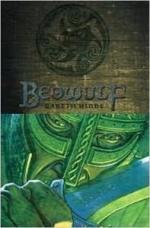In both of the quarters to barter and purchase
With lives of their friends. Then the well-aged ruler,
The gray-headed war-thane, was woful in spirit,
When his long-trusted liegeman lifeless he knew of,
{Beowulf is sent for.}
60 His dearest
one gone. Quick from a room was
Beowulf
brought, brave and triumphant.
As
day was dawning in the dusk of the morning,
{He comes at Hrothgar’s summons.}
Went
then that earlman, champion noble,
Came
with comrades, where the clever one bided
65 Whether
God all gracious would grant him a respite
After
the woe he had suffered. The war-worthy hero
With
a troop of retainers trod then the pavement
(The
hall-building groaned), till he greeted the wise one,
{Beowulf inquires how Hrothgar had enjoyed his night’s rest.}
The
earl of the Ingwins;[5] asked if the night had
70 Fully
refreshed him, as fain he would have it.
[1] Several eminent authorities
either read or emend the MS. so as to
make this verse read, While
Grendel was wasting the gold-bedecked
palace. So 20_15
below: ravaged the desert.
[2] For ‘sona’
(1281), t.B. suggests ‘sara,’ limiting
‘edhwyrft.’ Read
then: Return of sorrows
to the nobles, etc. This emendation supplies
the syntactical gap after
‘edhwyrft.’
[3] Some authorities follow
Grein’s lexicon in treating ‘heard ecg’
as
an adj. limiting ‘sweord’:
H.-So. renders it as a subst. (So v. 1491.)
The sense of the translation
would be the same.
[4] B. suggests ‘under hrof genam’ (v. 1303). This emendation, as well as an emendation with (?) to v. 739, he offers, because ‘under’ baffles him in both passages. All we need is to take ‘under’ in its secondary meaning of ‘in,’ which, though not given by Grein, occurs in the literature. Cf. Chron. 876 (March’s A.-S. Gram. Sec. 355) and Oro. Amaz. I. 10, where ‘under’ = in the midst of. Cf. modern Eng. ’in such circumstances,’ which interchanges in good usage with ’under such circumstances.’
[5] For ‘neod-laethu’
(1321) C. suggests ‘nead-laethum,’ and
translates:
asked whether the night
had been pleasant to him after
crushing-hostility.
XXI.
HROTHGAR’S ACCOUNT OF THE MONSTERS.
{Hrothgar laments the death of AEschere, his shoulder-companion.}
Hrothgar
rejoined, helm of the Scyldings:
“Ask
not of joyance! Grief is renewed to
The
folk of the Danemen. Dead is AEschere,
Yrmenlaf’s
brother, older than he,
5
My true-hearted counsellor, trusty adviser,
Shoulder-companion,
when fighting in battle
Our
heads we protected, when troopers were clashing,




